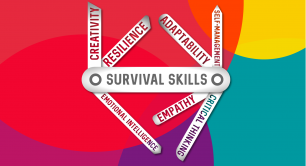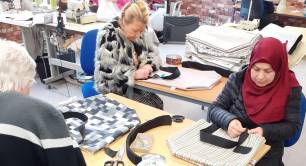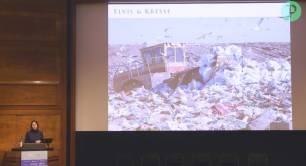Social Entrepreneurs' Survival Skill no. 1: Resilience
Social entrepreneurs will need to hone seven critical skills to ensure their organisations flourish in a post-Covid landscape and beyond. In this special series, learning and development experts Emerald Works and Social Enterprise Academy explore the stories of social change leaders who have put each of those skills into practice, and share some concrete ways to start building your own capacity and mindset. First up: resilience.
Failure, setbacks and disappointment are certainties in life. What matters, what makes the difference, is how we deal with them.
Nobody is born with an innate ability to cope effortlessly when things go wrong. We have to learn how to cope; we have to actively develop resilience.
First we have to be kind and compassionate with ourselves when storms blow into our lives. Try to keep a clear head, and recognise that few people can survive storms on their own. We must not be afraid to ask for support.
You can protect and grow your resilience by looking after your health and wellbeing, building your support network and changing your thinking from negative to positive.
- Interview: “The secret sauce is enabling compassion” - Musa Aamir, Rizq co-founder
- Resource: 10 ways to build your resilience
- Download: Worksheet: How resilient are you?
Harnessed in this way, resilience gives us the power to overcome problems. Resilient people don't dwell on failures; they acknowledge the situation, learn from their mistakes, seek support and move forward.
A positive perception of new and difficult circumstances can help too. Perhaps Little Women author Louisa May Alcott put it best: “I am not afraid of storms, for I am learning how to sail my ship”.
I am not afraid of storms, for I am learning how to sail my ship - Louisa May Alcott, author
True resilience is also about being human, looking after yourself so you're in a good state to withstand the troubles that bubble up in every life. Yes, you will still sometimes fall, but will recover to fight another day. Even if it takes time.
Having a good support system will help too. You don’t have to push yourself to the limit when you have people who you can rely on. Their support allows you to conserve your personal resources, so that you can stay calm and focused and make good decisions.
|
Could you be our 2021 Resilience Award Winner? The NatWest SE100 Index & Social Business Awards, open to social enterprises based in the UK, are open for applications until 25 April. If you're running a social venture that continually delivers positive social or environmental change, and repeatedly achieves impact goals – whatever the weather – you could be selected as this year's Resilience Award winner. Find out more about all six awards and the Top 100 index. |
Opportunities for growth
Resilient people see difficulties as an opportunity for growth, not as a negative reflection on their abilities. They are committed to their goals, and they have a compelling reason to get out of bed in the morning. They commit to their work, relationships, friendships, causes they care about and religious or spiritual beliefs.
They spend their time and energy focusing on situations and events they have control over, where they can have the most impact. They feel empowered and confident. People who worry about events beyond their control, on the other hand, often feel lost, helpless and powerless.
Psychologist Martin Seligman says the way that we explain setbacks to ourselves is also important.
People who are optimistic (and therefore have more resilience), he says, see the effects of bad events as temporary rather than permanent.
These people don't let setbacks affect other, unrelated, areas of their lives, either. They would say: “I'm not very good at this,” rather than: “I'm no good at anything”.
Resilient people don't let setbacks affect other areas... they say: I'm not very good at this, rather than: I'm no good at anything
Dr Cal Crow, co-founder of the Centre for Learning Connections, identified several further attributes common in resilient people:
- They have a positive image of the future. They maintain a positive outlook, and envision brighter days ahead.
- They have solid goals, and a desire to achieve them.
- They are empathetic and compassionate. However, they don't waste time worrying what others think of them. They maintain healthy relationships, but don't bow to peer pressure.
On the flip side of this, how do we know when our resilience is low? Clear signs would be binge-watching TV or scrolling endlessly on your phone – behaviours that point to someone zoning out from reality rather than facing it.
When our resilience is low, we are lethargic and unmotivated, which can put a strain on our relationships and leave us vulnerable to physical or mental illness.
Recovery in the aftermath of a crisis is key to preparing for the next one. You can be tempted to continue on the adrenaline high, but you need to acknowledge your feelings, to celebrate your “survival” and to calm down. Only then can you regroup, learn from the situation and nurture your growing resilience.
“The secret sauce is enabling compassion” - Musa Aamir
Musa Aamir is the co-founder of Rizq, a social enterprise in Pakistan that aims to end hunger by making it easier to provide food to those in need and by minimising food waste.
In 2020, Musa took part in Social Enterprise Academy’s Scotland: Pakistan Impact Link programme, which supported youth-led social enterprises in Pakistan to scale their innovative solutions to the Covid-19 pandemic.
Social Enterprise Academy facilitator Anne Martin spoke to him recently to discuss how resilience – in the form of connecting with the community, deep empathy for the problems they faced and a determination to help solve those problems – played a crucial part in Rizq’s response to the global crisis.
 Anne Martin: So Musa, we’re a year on from the start of the Covid-19 pandemic. Can you tell us where you were at this time last year?
Anne Martin: So Musa, we’re a year on from the start of the Covid-19 pandemic. Can you tell us where you were at this time last year?
Musa Aamir: Last February we were gearing up for our fifth anniversary at Rizq – a big moment for us. We were banking on that event to capitalise on momentum, to gain more users and a lot more business opportunities.
Around that time, we had about two to three months left in us. As Covid-19 hit, we were pretty down and dusted, but we kind of rose up out of the ashes.
Right at the cusp of Covid-19, the issue of hunger came to the national forefront in Pakistan. As we had been shouting about the issue for years, we were uniquely positioned to help.
A few months into Covid, many people were being laid off and we were desperately trying to round up more people to help with distributing food through our technology platform. Our journey has definitely been a journey of resilience.
As Covid-19 hit, we were pretty down and dusted, but we kind of rose up out of the ashes
But also the resilience has come from the community – the people on the ground who are not sure where their next meal is going to come from and who are dealing with layoffs from work. Their resilience is something that really motivated us to move forward.
I have seen people hosting food banks and soup kitchens. During these times, they still chose to do that – to prioritise filling other people’s stomachs. It shows you how much a person can do in these situations and I think that’s a mark of a resilient human being and a resilient community at large.
AM: Resilient individuals and resilient communities that you’ve brought together as a team! There have been so many social enterprises forced into hibernation during Covid-19, but you’ve done the opposite. What do you think helped you?
MA: Coming from an academic background, for a long time I thought hunger was an economic issue. But behind all of that, it is a human issue. Hunger is not a problem, it is an indicator and symptom of a challenge to our human values. The solution then is not a systemic solution, the solution is a human one.
So that's why we are mobilising human beings – compelling them to show their compassion. We realised that our trump card is the youth of Pakistan. If we are able to mobilise them and enable them to show their compassion, that is the real solution.
The secret sauce is enabling that compassion in others and yourself. My compassion has been enabled by seeing a whole host of people come to drop off food.
During the pandemic, it’s a risk for people to leave their homes. Seeing that human spirit is really beautiful. And as long as the human social fabric is intact, I think that everything‘s going to be OK.
We also continuously updated our website and social media channels and ran a campaign called ‘Compassion Versus Corona’ to get the word out. We weren’t afraid of getting more people on board.
I know sometimes it doesn’t make sense when you don’t have any financing, but there is an age-old wisdom in Pakistan: ‘Whenever you break food, break food in two’. Then whenever you break food in two, you can break food in four. You should keep creating food from that single piece.
AM: Musa, you’re not frightened to share or ask for help. That, alongside your compassion, I think, allows you to see opportunities and take opportunities – a key component of resilience.
MA: Exactly, because when you’re not doing it for yourself, you have nothing to lose. When you’re driven towards a cause, you automatically become braver. You get courage from unexpected places because you get help from unexpected places as well.
This collaborative approach had always been our motto, as very early on with Rizq, I realised that hunger is not just my problem and I cannot solve it alone.
When you’re driven towards a cause, you become braver. You get courage from unexpected places because you get help from unexpected places
There isn’t any competition – if I compete, I actually go against the principles of the company and against the principles of sustenance as well, because competition actually inhibits sustenance.
Another reason why we grew so much during Covid is because we weren’t reluctant to accept people coming into the fold. In some areas of the world, there can be partners picking and choosing who they want to work with, but we were open-armed to everyone. We just said, ‘We have this problem, we have so many people to feed, if you can play a part please come and join in.’ That humbleness and welcoming approach has really catapulted us to reach more people in Pakistan.
AM: Finally, you mentioned that young people’s compassion is the key to a changing society. Is there any advice you’d give to young people to build their resilience and realise their vision?
MA: What I say to a lot of students here is that you have to realise the inherent value a human being possesses. You have to give them the honour and dignity that is their right.
Unfortunately, this practice is becoming obsolete in our culture. When I was young, I always used to know whether our neighbour was hungry or not. As I grew up, I realised that connection and that social fabric that had been present within my own society had disintegrated. That is completely due to not being able to give the human being right next to you the value and compassion due to them.
Being brave enough to always give that compassion will be your success factor. Because when you are able to do that, you automatically create a charisma within yourself and a position for yourself in society, where people gravitate towards you. People start to acknowledge you and see you as a friend.
When that happens, that is the point where your social enterprise will kick off – you need to have people behind you to work together for a cause, you cannot do it alone.
It will definitely take time but when you mobilise people and they are ideologically aligned with you, that is the strength you need. You do not need to strengthen the business models, the investments or the technology. The strength you truly need is in the people.
Our community and the people around us are vital in helping build our resilience, but the key to becoming a highly resilient person starts with ourselves.
10 Ways to Build Your Resilience
The good news is that even if you're not a naturally resilient person, you can learn to develop a resilient mindset and attitude. To do so, incorporate the following into your daily life:
1. Learn to relax. When you take care of your mind and body, you cope more effectively with challenges in your life. Develop a good sleep routine, try out a new exercise or use physical relaxation techniques, like deep breathing or meditation.
2. Practise thought awareness. Resilient people don't let negative thoughts derail their efforts. Instead, they practise positive thinking. This means listening to how you talk to yourself when something goes wrong. If you find yourself making statements that are permanent, pervasive or personalised, correct these thoughts in your mind.
3. Edit your outlook. Practise cognitive restructuring, the therapeutic techniques that help people notice and change their negative thinking patterns.
4. Learn from your mistakes and failures. Every mistake has the power to teach you, so look for the lesson in every situation. Also, ensure that you understand the idea of “post-traumatic growth”. People often find that crisis situations allow them to re-evaluate their lives and make positive changes.
5. Choose your response. We all experience bad days but we have a choice in how we respond. We can react with panic and negativity, or remain calm and logical to find a solution. Your reaction is always up to you.
6. Maintain perspective. Resilient people understand that although a situation may seem overwhelming in the moment, it may not have that much of an impact in the long-term. So try to avoid blowing events out of proportion.
7. Set yourself some goals. If you don't already, learn to set SMART (Specific, Measurable, Achievable, Relevant, Time-bound) effective personal goals that match your values.
8. Build your self-confidence. Resilient people are always confident they will succeed eventually, despite the setbacks or stresses that they might be facing. This self-belief also enables them to take risks. When you develop confidence and a strong sense of self, you have the strength to keep moving forward, and to take the risks you need to get ahead.
9. Develop strong relationships. People who have strong connections at work are more resistant to stress, and they're happier in their role. This also goes for your personal life. The more real friendships you develop, the more resilient you're going to be – because you have a strong support network to fall back on. (Remember that treating people with compassion and empathy is very important here.)
10. Be flexible. Resilient people understand things change, and that carefully-made plans may, occasionally, need to be amended or scrapped.
|
More tools and resources to start developing resilience
|
Coming soon: how to nurture your adaptability – how to be flexible but manage your boundaries, and why continual learning, curiosity and innovation can help you cope with change.




